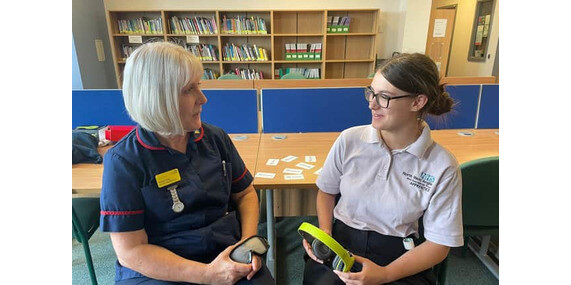(Dementia nurse specialist Alison Gray and apprentice Megan Goodridge).
Total of 89 staff have attended training in last 18 months
A new scheme to help hospital staff communicate with dementia patients has been introduced at Peterborough City Hospital.
North West Anglia NHS Foundation Trust offers nationally-recognised in-house Interpreter training to nurses, health care assistants, medical students, apprentices, hospital volunteers and other staff who provide care to, or come into contact with, dementia patients.
Due to recent demand, the sessions run regularly at Peterborough City Hospital and at Hinchingbrooke Hospital, Huntingdon and put the trainees in a patient and carer role play situation.
Dementia nurse specialist Alison Gray and dementia advisor Sherly Binu are both qualified to deliver the training, and since it was introduced 18 months ago, some 89 members of Trust staff have attended the three hour course.
Alison said, The training is not about interpreting the spoken word, but more about understanding non-verbal communication and being able to accurately interpret body language, actions or gestures to understand and meet the patients needs and feelings.
This training provides an alternative way to communicate with people with dementia, putting the nursing teams in the patients shoes so that they can experience barriers in communication.
For example, the training can include the restriction of hands to allow communication only by movement of the legs, head gestures or use of facial expressions. It also impairs the trainees senses such as speech, eyesight and hearing.
Many of our dementia patients communicate non-verbally, and one of the aims of the training is to give trainees the tools to be able to interpret various forms of physical communication.
Among those to have successfully completed the eye opening training is apprentice Megan Goodridge.
She said, I learned a great deal about how to help people who suffer from dementia and how to advise carers who look after people with dementia.
The training was very interactive, putting us in the shoes of a person with dementia and did present a rollercoaster of emotions.
As the carer, it was easy to feel sad, frustrated, and useless because it was very difficult to communicate with the person. As the person with muffled hearing, reduced eyesight, and an inability to speak properly, it was very upsetting and frustrating.
She added, I now know these are some of the many negative feelings someone with dementia experiences. This training was an eye opener to just how much people with dementia suffer in so many other aspects beyond memory. As a healthcare worker, I have learned that patience is important, as well as being calm and understanding that patients cannot communicate the way we are used to.
Other ways of communicating can include touch with patients knowing I am next to them, letting them feel what you are trying to do, writing on a whiteboard so they can see what you are saying,
etc. This training taught me a lot about dementia from both the patients side and the carers side, meaning I now have the skills to help both sides.
Completing the course means that successful staff will become a registered Dementia Interpreter Level 1.

